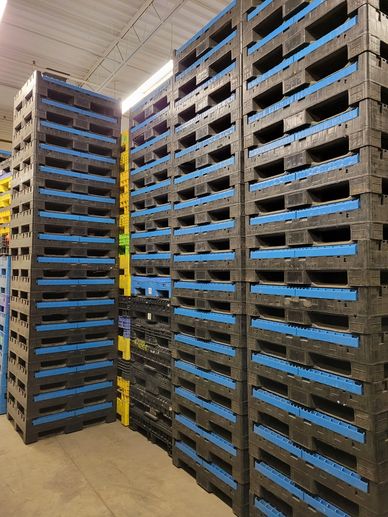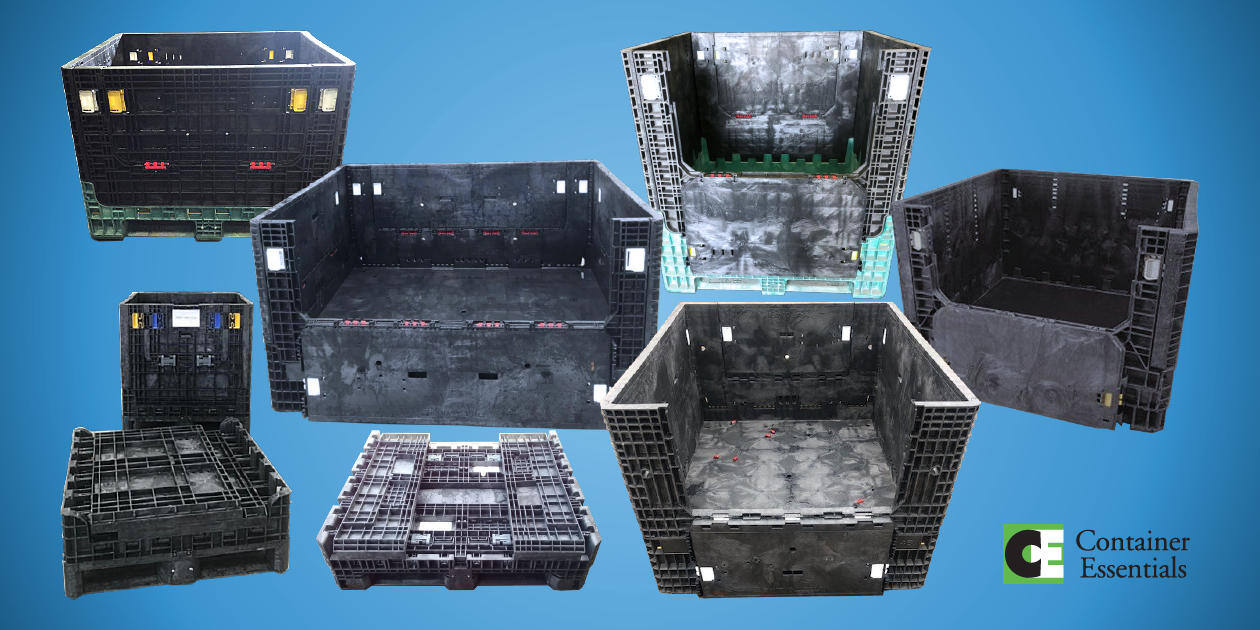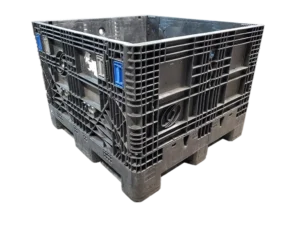Why Mass Containers Are Essential for Lasting and Cost-efficient Transport
Mass containers play an important duty in modern-day logistics. They promote the reliable activity of large amounts of goods, consequently maximizing transport processes. This technique not just minimizes prices however likewise decreases environmental impact through lower exhausts and waste generation. As sectors seek more lasting methods, the fostering of bulk containers is becoming progressively considerable. What effects does this change hold for future logistics and supply chain administration?

The Advantages of Using Bulk Containers in Logistics
Bulk containers reinvent logistics by boosting efficiency and sustainability. These containers enable the transportation of huge quantities of items in a single journey, noticeably minimizing the variety of journeys required. This not only improves operations however also lessens labor prices linked with handling, filling, and unloading. On top of that, bulk containers are designed to optimize space application within transportation automobiles, making sure that more items can be delivered simultaneously.
The standardization of bulk containers additionally streamlines the logistics process. With consistent measurements, they can be easily piled and kept, causing enhanced warehouse monitoring. Furthermore, mass containers usually feature long lasting products that safeguard materials from damages throughout transit, therefore reducing item loss and enhancing overall integrity. Because of this, businesses can experience improved supply chain efficiency, eventually bring about boosted profitability and consumer contentment. This mix of aspects makes mass containers a vital asset in contemporary logistics.
Environmental Impact: Lowering Waste and Carbon Footprint
As markets significantly prioritize sustainability, the adoption of mass containers has actually emerged as a crucial technique for lowering waste and reducing carbon impacts. These containers minimize making use of packaging materials, such as boxes and plastic, therefore significantly lowering overall waste generation. By combining deliveries, bulk containers improve transport effectiveness, enabling more items to be moved per trip. This reduction in trips straight associates with reduced greenhouse gas emissions, adding to a smaller carbon footprint.
Mass containers can often be reused or recycled, additionally minimizing ecological effect. The longevity of these containers guarantees they can withstand several transport cycles, minimizing the requirement for single-use choices. used plastic containers. By streamlining logistics and advertising effective resource use, bulk containers not only support sustainable methods however likewise encourage markets to line up with worldwide environmental goals. Eventually, their application reflects a dedication to environmental stewardship and liable resource management
Cost Financial Savings: Just How Mass Containers Lower Transport Costs
While numerous firms look for methods to improve their bottom line, using mass containers presents a significant chance for reducing transport costs. Bulk containers maximize the quantity of goods delivered, allowing businesses to ship larger amounts simultaneously. This effectiveness decreases the variety of trips required, straight reducing gas prices and lessening labor expenses connected with loading and discharging.
Furthermore, bulk containers often include streamlined designs that maximize space use within transport vehicles. This suggests fewer voids, leading to a lot more reliable use readily available capability. The longevity of bulk containers can decrease the danger of item damages during transit, making certain and decreasing losses that even more goods show up undamaged.
Enhancing Supply Chain Effectiveness With Mass Storage Solutions
Mass storage space remedies play a crucial role in improving supply chain efficiency by enhancing stock administration. By combining goods into fewer, bigger containers, services can significantly minimize managing prices linked with frequent transfers and processing. This streamlined method enables far better tracking and monitoring of inventory, eventually bring about enhanced functional efficiency.
Structured Supply Monitoring
Effective inventory monitoring is essential for maximizing supply chain procedures, especially when organizations adopt bulk storage solutions. These remedies allow businesses to preserve greater stock levels while minimizing the frequency of replenishment. By consolidating products right into mass containers, companies can improve their stock processes, reducing the intricacy related to tracking several smaller plans. This technique assists in precise inventory matters and enhances forecasting accuracy, permitting for more informed decision-making. Additionally, mass storage space services simplify warehouse organization, making it easier to locate and gain access to products when required. Because of this, companies can achieve an extra effective supply turn over price, inevitably boosting general supply chain efficiency and minimizing the likelihood of stockouts or overstock scenarios.

Minimized Handling Prices
The implementation of bulk storage space remedies not only improves supply monitoring but likewise substantially reduces taking care of costs across the supply chain. By combining products into bulk containers, business decrease the need for regular handling and transfer between different storage and transport devices. This approach cuts down on labor costs connected with loading, dumping, and relocating smaller bundles. In addition, bulk storage minimizes the regularity of shipments, causing reduced transportation costs and decreased gas consumption. Consequently, organizations can optimize their logistics operations, enabling a much more effective allowance of sources. Eventually, reduced managing expenses add to improved general supply chain effectiveness, promoting an atmosphere that sustains both sustainability and economic viability.

Versatility of Bulk Containers Throughout Numerous Industries
Several sectors have distinct requirements for transportation and storage, bulk containers have emerged as a flexible option that fulfills a wide range of needs. These containers, ranging from large bins to specialized tanks, can suit varied products, consisting of powders, granules, and fluids. In the farming market, mass containers help with the transport of fertilizers and grains, while the food and beverage industry utilizes them for active ingredients and finished items. The chemical industry counts on mass containers for securely moving unsafe products, making certain conformity with safety and security laws. In addition, building and construction companies profit from bulk containers for transferring aggregates and other products. Their versatility encompasses different modes of transportation, including ships, trains, and vehicles, boosting logistical efficiency. This adaptability not just enhances procedures across different markets yet additionally promotes sustainability by minimizing packaging waste and enhancing room in transportation. As a result, mass containers play a crucial duty in modern supply chain management.
Future Patterns in Bulk Container Usage and Sustainability
The future of mass container use is progressively shaped by cutting-edge materials advancement that enhances sustainability. Furthermore, automation in logistics promises to enhance operations, minimizing waste and enhancing efficiency. Accepting round economic situation practices will certainly further reinvent how bulk containers are designed, utilized, and reused, promoting a more sustainable transport landscape.
Ingenious Products Growth
As industries progressively focus on sustainability, innovative materials advancement wholesale containers emerges as a considerable variable in boosting environment-friendly transportation options. Manufacturers and researchers are checking out eco-friendly plastics, recycled composites, and light-weight steels to decrease environmental influence. These products not just minimize waste but likewise boost gas performance by lowering the overall weight of containers. Additionally, developments in wise products, which over here can adapt to varying conditions, improve the longevity and functionality of bulk containers. The integration of these innovative materials aligns with round economy concepts, advertising reuse and recycling. As the need for lasting techniques expands, the advancement of such materials will play an important role in shaping the future of bulk container use in logistics and transportation.
Automation in Logistics
Significant advancements in automation are positioned to change logistics and the application of mass containers, improving sustainability in transportation. Automated systems, including drones and autonomous vehicles, are streamlining the movement of mass containers, lowering the dependence on standard fuel-powered transport. These innovations optimize transmitting and filling procedures, reducing empty miles and improving gas effectiveness. In addition, automated supply management systems enhance monitoring and surveillance of bulk containers, guaranteeing better resource allowance and decreased waste. The assimilation of the Web of Points (IoT) permits real-time information evaluation, enabling aggressive decision-making that lines up with sustainability goals. As automation remains to progress, it is anticipated to drive additionally advancements wholesale container usage, eventually supporting more sustainable logistics methods and minimizing the ecological effect of transport.
Circular Economic Climate Practices
Developments in automation are establishing the stage for a much more incorporated strategy to circular economic climate practices in the domain of mass container use. As sectors increasingly welcome sustainability, bulk containers are being designed for durability and reusability. This change not only lessens waste but likewise boosts resource effectiveness. Firms are adopting approaches such as closed-loop systems, where utilized containers are collected, refurbished, and reestablished right into the supply chain. Additionally, wise modern technologies track container life cycles, assisting in far better monitoring and minimizing environmental impact. The partnership in between suppliers, logistics suppliers, and end-users is essential in establishing requirements for lasting container usage. used collapsible bulk containers. Future patterns suggest an expanding focus on products that are biodegradable and recyclable, further enhancing the round economy's principles wholesale transportation

Often Asked Concerns
What Materials Are Bulk Containers Typically Made From?
Mass containers are typically built from durable products such as high-density polyethylene, steel, cardboard, he said and light weight aluminum. These materials supply adaptability, toughness, and protection, making them suitable for moving various goods in different markets effectively.
Just how Do I Choose the Right Dimension Mass Container?
Picking the appropriate dimension mass container entails reviewing the quantity of materials to be transported, considering managing tools compatibility, and appraising storage room needs. Correct size warranties performance in transport and reduces waste during shipment.
Are Mass Containers Reusable or Recyclable?
Mass containers are often multiple-use, made for numerous trips, improving sustainability. Many can additionally be reused, relying on the materials used. Picking recyclable choices even more supports ecological objectives and decreases waste in transport practices.
What Safety And Security Rules Put On Bulk Container Transportation?
Safety regulations for bulk container transport include conformity with the Department of Transportation standards, correct labeling of harmful materials, structural honesty evaluations, and adherence to weight limitations to assure risk-free handling and avoid crashes during transportation.
Exactly How Can Services Transition to Utilizing Bulk Containers Successfully?
Businesses can alter to bulk containers by assessing existing logistics, training team on handling, investing in appropriate tools, enhancing supply management, and working together with suppliers to ensure compatibility and effectiveness throughout the supply chain.
As industries significantly prioritize sustainability, the fostering of bulk containers this link has actually emerged as a key approach for reducing waste and reducing carbon impacts. By settling materials into bulk containers, business can simplify their inventory processes, minimizing the complexity linked with tracking multiple smaller plans. As industries progressively prioritize sustainability, ingenious materials advancement in mass containers arises as a significant aspect in boosting eco-friendly transportation options. Automated systems, consisting of drones and independent vehicles, are streamlining the movement of bulk containers, reducing the reliance on conventional fuel-powered transport. Additionally, automated inventory management systems improve tracking and monitoring of bulk containers, guaranteeing much better resource allowance and minimized waste.